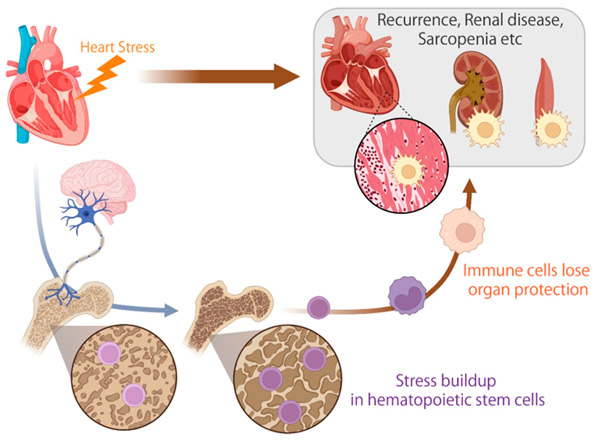New publications
Understanding 'heartbreak' - study finds link between stress and heart failure
Last reviewed: 02.07.2025

All iLive content is medically reviewed or fact checked to ensure as much factual accuracy as possible.
We have strict sourcing guidelines and only link to reputable media sites, academic research institutions and, whenever possible, medically peer reviewed studies. Note that the numbers in parentheses ([1], [2], etc.) are clickable links to these studies.
If you feel that any of our content is inaccurate, out-of-date, or otherwise questionable, please select it and press Ctrl + Enter.

The stress of heart failure is remembered by the body and can lead to relapse and other related health problems, a study shows. Scientists have found that heart failure leaves a "stress memory" in the form of changes in the DNA of hematopoietic stem cells, which are involved in making blood and immune cells called macrophages.
These immune cells play an important role in protecting heart health. However, an important signaling pathway (a chain of molecules that transmit signals within a cell) called transforming growth factor beta (TGF-β) in hematopoietic stem cells was suppressed during heart failure, negatively affecting macrophage production.
Improving TGF-β levels may provide a new treatment for recurrent heart failure, and detecting accumulation of stress memory may provide an early warning before it occurs.
Healthy lifestyles and improved well-being are part of the UN’s global Sustainable Development Goals. Positively, a recent study shows that life expectancy worldwide will increase by around 4.5 years by 2050. This is largely due to public health efforts to prevent disease and improve survival from conditions such as cardiovascular disease. However, heart disease is still the leading cause of death worldwide, with an estimated 26 million people suffering from heart failure.
Once heart failure occurs, it tends to recur, accompanied by other health problems such as kidney and muscle disease. Researchers in Japan wanted to understand what causes these recurrences and deterioration of other organs, and whether it can be prevented.
The study is published in the journal Science Immunology.
"Based on our previous studies, we hypothesized that relapses may be caused by stress experienced during heart failure, which accumulates in the body, especially in hematopoietic stem cells," explained project professor Katsuito Fujio of the University of Tokyo Graduate School of Medicine. Hematopoietic stem cells are found in the bone marrow and are the source of blood cells and immune cells called macrophages, which help protect heart health.

This illustration shows that during heart failure, stress signals are transmitted to the brain, which then passes them on via nerves to hematopoietic stem cells in the bone marrow, accumulating as stress memory. These stress-accumulated stem cells produce immune cells with reduced protective capabilities for organs such as the heart, kidneys, and muscles. Source: Science Immunology (2024). DOI: 10.1126/sciimmunol.ade3814
In mice with heart failure, the researchers found evidence of stress imprinting on the epigenome, meaning chemical changes had occurred in the mice’s DNA. An important signaling pathway called transforming growth factor beta, which is involved in regulating many cellular processes, was suppressed in the hematopoietic stem cells of mice with heart failure, leading to the production of dysfunctional immune cells.
These changes persisted over time, so when the team transplanted bone marrow from mice with heart failure into healthy mice, they found that the stem cells continued to produce dysfunctional immune cells. These mice subsequently developed heart failure and became susceptible to organ damage.
"We called this phenomenon a stress memory because the stress of heart failure is remembered for a long time and continues to affect the entire body. Although various other types of stress can also leave this stress memory, we believe that the stress caused by heart failure is particularly significant," Fujio said.
The good news is that identifying and understanding these changes in the TGF-β signaling pathway opens up new possibilities for potential future treatments.
"Completely new therapies may be considered to prevent the accumulation of this stress memory during hospitalization in heart failure," Fujio said. "In animals with heart failure, adding additional active TGF-β has shown potential as a treatment option. Correcting the epigenome of hematopoietic stem cells may also be a way to eliminate stress memory."
Now that this has been identified, the team hopes to develop a system that can detect and prevent the accumulation of stress memory in people, with the long-term goal of not only preventing heart failure from recurring, but also identifying the condition before it fully develops.
